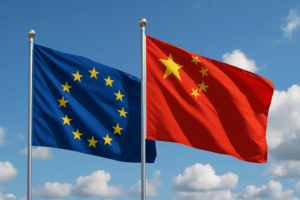Two years after the beginning of the Covid-19 pandemic in Italy, ECCO, the Italian climate think tank, and More in Common present a new analysis on the perception of Italian public opinion. The study was carried out through a survey conducted by the polling institute YouGov.
The full report is available here. (Italian only)
The picture of Italy that emerges from the analysis shows a divided Country, particularly concerned about employment, health and climate change. At the same time, the pandemic and the ecological transition are perceived as opportunities for change among different age groups and political orientations.
Key findings:
- Italians are fully aware of the impacts of climate change.
- The ecological transition is perceived as an opportunity for change and economic growth.
- The majority of Italians are in favor of radical changes in their habits, even more so than in the other five European countries where the survey was conducted (Germany, Spain, Poland, France and the United Kingdom).
- For 56% of Italians, this change includes gradually or immediately phasing out from fossil gas.
- The 18-29 age group is less hopeful but more willing and ready for change.
- The majority of the public opinion calls for a greater commitment of institutions to tackle climate change and considers the actions taken so far as insufficient or unsuccessful.
- Most Italians would like Italy to be more active on climate, independently of the action taken by other major powers.
- Big companies and the politicians are seen as the main culprits for the worsening climate crisis. In contrast, small and medium-sized enterprises are more trusted.
- There is a great lack of representation across the political spectrum on climate issues, despite the fact that the Italian electorate is ready to tackle the issue and is looking for leadership.
- Italians reveal a strong sense of resignation and mistrust towards politics, institutions, the media and their neighbors in general – even more pronounced than in other countries – but at the same time they are ready to take more individual and collective action.
The survey collected the opinions of about 2,000 Italians, selected according to socio-demographic criteria to ensure the representativeness of the population, and was carried out in December 2021.
Four macro-areas were included in the analysis:
- impact of the Covid-19 pandemic
- employment and the economy;
- trust in institutions, the private sector and the media;
- climate change and ecological transition.
Two years of pandemic have left a divided country, with a population less supportive of its fellow citizens than before the pandemic. Young people in particular, compared to other age groups, are more exposed to loneliness and anxiety that the pandemic has generated, but at the same time they are eager for change.
Mistrust of institutions is evident both in general and when it comes to issues related to the environment and the management of recovery plans, such as the Italian National Recovery and Resilience Plan. At the same time, the pandemic is perceived as an opportunity for change. Italians believe that this change can also come about through the ecological transition, seen by many as an opportunity for economic growth. The analysis shows that citizens are ready to do their part and believe in the importance of individual actions, but are also aware of the role that politics and big business play in climate action.
In this sense, it is in the search for solutions to tackle the climate crisis that a political vacuum emerges, and no political party seems to have been able to fill it. In fact, 61% of respondents are convinced that there is not a single party that is responding correctly to the challenge posed by the climate crisis.
Political representatives therefore have an opportunity to fill this leadership gap in climate action through a new narrative of energy transition that enables change and is perceived by people more as an opportunity than an insurmountable burden, while not ignoring its complexity and difficulties.
ECCO’s report is part of the “Navigating Uncertainty” project conducted by More in Common. The project also includes surveys in other European countries (Germany, Spain, Poland, France and the UK) and aims to contribute to the development of narratives and policies capable of meeting future challenges and, through its comparative nature, to analyse and compare the development of issues such as trust, pluralism and climate in the various countries involved.
For interviews or more information on the use and dissemination of the content in this briefing, please write to comunicazione@eccoclimate.org






